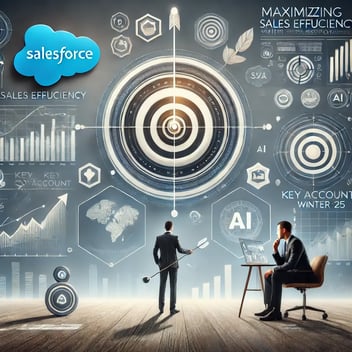Foundations of Effective Account Management
B2B Strategic Account Management Series, article 2 of 4
In B2B sales, the key to leading clients on...
As your business expands, manually managing your prospects and customers with spreadsheets and scattered notes in various locations becomes nearly impossible.
This type of "system" not only consumes a significant amount of time and energy but also leads to important details slipping through the cracks at an alarming rate. This can exhaust your team and disappoint your customers.
To prevent this from happening, it's essential to implement a CRM system.
CRM stands for Customer Relationship Management. It is a technology system that helps businesses manage their interactions and relationships with existing and potential customers. CRM systems are designed to streamline and automate various sales and marketing processes, allowing companies to better understand their customers, improve customer satisfaction, and ultimately drive revenue growth.
A CRM system serves as a central database where businesses can store and manage customer data, including contact information, purchase history, communication records, and other relevant details. This information can be accessed and updated by different teams within the organization, providing a comprehensive view of each customer's journey and enabling personalized interactions and targeted marketing efforts.
CRM systems play a crucial role in empowering sales teams and improving their performance. Here are some key ways CRM systems benefit sales teams:
- Efficient Lead Management: CRM systems help sales teams efficiently manage their leads by providing a centralized platform to track and prioritize leads. This ensures that sales reps can focus their efforts on high-potential leads and follow up in a timely manner.
- Enhanced Communication and Collaboration: CRM systems facilitate seamless communication and collaboration among sales team members. They can easily share customer information, notes, and updates, ensuring that everyone is aligned and well-informed.
- Sales Pipeline Visibility: CRM systems offer real-time visibility into the sales pipeline, allowing sales managers to track the progress of deals, identify bottlenecks, and make data-driven decisions. This enables sales teams to prioritize their activities and optimize their sales processes.
- Data-Driven Insights: CRM systems provide valuable insights and analytics that help sales teams identify trends, analyze customer behavior, and make informed sales strategies. These insights enable sales reps to personalize their approach, anticipate customer needs, and increase sales effectiveness.
- Automation of Routine Tasks: CRM systems automate repetitive and time-consuming tasks, such as data entry, follow-up reminders, and generating reports. This frees up sales reps' time, allowing them to focus on building relationships with customers and closing deals.
We help B2B sales teams achieve sales success via improved Stakeholder Engagement. Click the button to learn more.
Implementing a CRM system can offer numerous benefits for B2B companies. Here are some key advantages:
- Improved Customer Relationship Management: CRM systems provide a holistic view of each customer, enabling B2B companies to better understand their needs and preferences. This helps build stronger relationships, deliver personalized experiences, and increase customer loyalty.
- Increased Sales Efficiency: CRM systems streamline sales processes, reducing manual tasks and improving efficiency. Sales reps can easily access customer information, track interactions, and manage leads, allowing them to focus on selling and closing deals.
- Enhanced Sales Forecasting and Planning: CRM systems provide accurate and up-to-date sales data, allowing B2B companies to forecast future sales, identify trends, and make more accurate sales plans. This helps in setting realistic targets, allocating resources effectively, and optimizing sales strategies.
- Improved Sales Team Collaboration: CRM systems facilitate collaboration among sales team members by providing a centralized platform to share information, collaborate on deals, and communicate effectively. This leads to better coordination, increased productivity, and improved teamwork.
- Better Customer Service: CRM systems enable B2B companies to provide faster and more personalized customer service. With access to customer history and preferences, sales reps can address customer inquiries and resolve issues in a timely and efficient manner.
- Data Security and Compliance: CRM systems offer robust security measures to protect sensitive customer data. They ensure compliance with data protection regulations, such as GDPR, and provide audit trails for accountability and transparency.
There are several popular CRM systems available in the market, each with its own unique features and capabilities. Here are some of the most widely used CRM systems:
- Salesforce: Known as the industry leader, Salesforce offers a comprehensive CRM platform with a wide range of functionalities, including sales, marketing, and customer service.
- HubSpot CRM: HubSpot CRM provides a user-friendly interface and integrates seamlessly with other HubSpot tools. It offers features like contact management, email tracking, and deal tracking.
- Zoho CRM: Zoho CRM is a cloud-based CRM system that offers a customizable and scalable solution. It provides features such as lead management, workflow automation, and analytics.
- Microsoft Dynamics 365: Microsoft Dynamics 365 is a versatile CRM system that integrates with other Microsoft products. It offers modules for sales, marketing, customer service, and more.
- Pipedrive: Pipedrive is a user-friendly CRM system designed specifically for sales teams. It focuses on pipeline management, deal tracking, and sales forecasting.
When choosing a CRM system, it's important to consider the specific needs and requirements of your B2B company, as well as factors like scalability, integration capabilities, and user-friendliness.
We help B2B sales teams achieve sales success via improved Stakeholder Engagement. Click the button to learn more.
B2B Strategic Account Management Series, article 2 of 4
In B2B sales, the key to leading clients on...

Discover how to leverage LinkedIn Sales Navigator within Salesforce to optimize your sales...

Salesforce’s Winter ’25 release brings a suite of powerful enhancements to Sales Cloud,...
